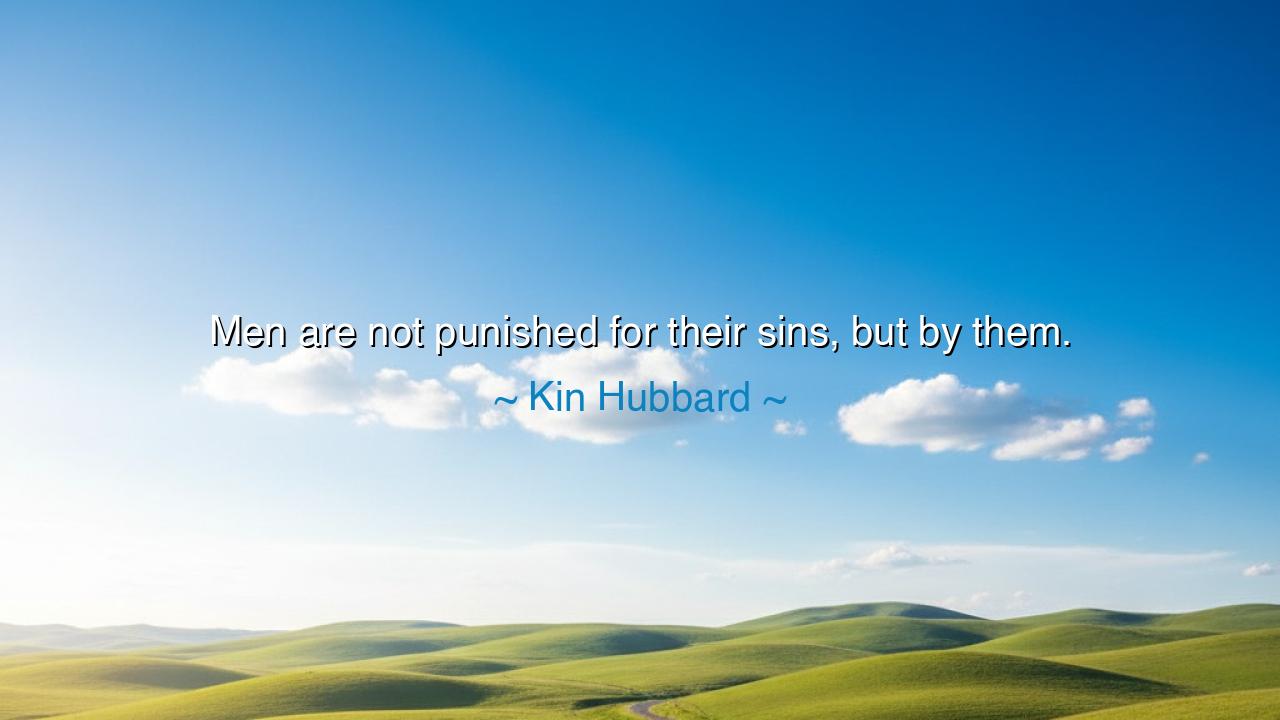
Men are not punished for their sins, but by them.






Hear the grave yet luminous wisdom of Kin Hubbard, who declared: “Men are not punished for their sins, but by them.” These words are not the language of mere morality, but the revelation of a law woven deep into the fabric of existence. For Hubbard reminds us that sin, wrongdoing, and folly carry within themselves the seed of their own retribution. It is not an angry deity striking from afar, nor an external judge wielding the rod, but the act itself that becomes its own punishment.
The heart of the saying lies in this: every sin bears consequences that spring forth as naturally as harvest from seed. The liar, though unexposed, carries the weight of mistrust, first from others and then from his own conscience. The thief, though escaping prison, lives in fear of discovery, chained by suspicion and restlessness. Thus, even when no earthly authority convicts, the soul convicts itself, and the wrong becomes the scourge. The punishment is not added after, but born within the act itself.
History provides us with mirrors of this truth. Think of Macbeth, in Shakespeare’s tragedy. Having murdered his king to seize power, he gained the crown but lost his peace. Night after night he was haunted by visions, and his kingdom, though vast, became a prison of suspicion and fear. None needed to punish him with chains, for his own deeds had forged fetters stronger than iron. His downfall teaches us that wrongdoing is self-destructive: the punishment was not imposed upon him—he carried it within.
Likewise, consider the fate of Richard Nixon in the Watergate scandal. He was not cast down by the opposition alone, but by his own deception. The web of lies and secret machinations brought shame not merely from others, but from the truth of his actions unraveling before the world. Here again, the wrongdoing itself birthed the disgrace. His legacy was marred not because punishment was imposed, but because the seeds of corruption bore their bitter fruit.
This teaching, though stern, is also merciful. For if men are punished by their sins, then they are also freed when they turn from them. The liar who chooses truth sheds the weight of deceit; the unjust who embraces righteousness dissolves the poison within. The law of Hubbard’s wisdom is not only that sin destroys, but also that repentance heals. Thus, the path of redemption is always open to those who dare to change.
The lesson is clear: let no man imagine that wrongdoing leaves no mark. Even if no one else sees, the soul itself sees, and carries the burden. Therefore, be watchful of your choices, for they will shape not only your reputation but your inner peace. Choose honesty, and you will dwell in freedom. Choose compassion, and you will harvest joy. Choose justice, and you will walk unafraid.
Practical is this counsel: when tempted toward dishonor, pause and ask yourself, “Will this deed itself become my punishment?” Let this thought guard you as a shield. And when you look upon others, remember also to show mercy, for they may already be bearing punishment in the form of their own regret, fear, or unrest. To lift them toward good is greater than to condemn them in their fall.
Thus remember always the teaching of Kin Hubbard: “Men are not punished for their sins, but by them.” Wrongdoing is its own retribution, just as virtue is its own reward. Therefore, live in such a way that your deeds are not shackles, but wings—lifting you higher, freer, and nearer to the dignity for which you were born.






AAdministratorAdministrator
Welcome, honored guests. Please leave a comment, we will respond soon